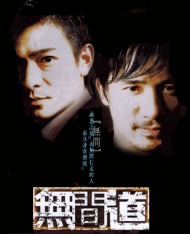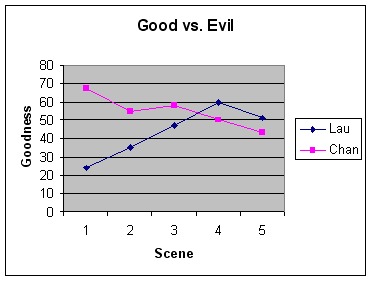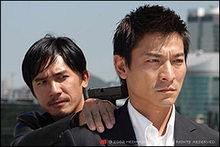|
Infernal Affairs
aka Wu jian dao
|
| |
 |
Cantonese language. Hong Kong, 2002.
Not rated. 97 minutes.
Cast:
Andy Lau, Tony Leung Chiu Wai, Anthony Wong, Eric Tsang, Kelly Chen, Sammi
Cheng
Writers: Felix Chong, Sui Fai Mak
Music: Kwong Wing Chan
Cinematographers: Yiu-Fai Lai, Wai Keung Lau
Producer: Andy Lau
Directors: Wei Keung Lau, Sui Fai Mak
LINKS
|
 he premise:
The police force has an undercover officer in the gang triad. The triad has
an undercover gangster in the police force. Both organizations are aware of
the existence of a mole in their midst, but unaware of his identity.
he premise:
The police force has an undercover officer in the gang triad. The triad has
an undercover gangster in the police force. Both organizations are aware of
the existence of a mole in their midst, but unaware of his identity.
Admittedly, my knowledge of Hong Kong cinema is far from exhaustive, but Infernal
Affairs is the best action film I've seen from there since Hard
Boiled. One of its strengths, oddly enough, is its lack of action--or
at least, its lack of the high-flying, slo-mo, bullet ballets that have made
the genre famous. The weapon of choice in Infernal Affairs is not the
gun but the cell phone. When a drug deal goes down, instead of checking their
guns at the door, the suppliers check their cell phones. War is waged by phone,
with crucially timed calls and rings doing just as much damage as a well placed
bullet.
In place of over-the-top ballistics, Infernal Affairs milks its premise
for suspense and uses it as an opportunity to examine the relation of occupation
to morality. With a cop who has to pretend to be bad to win the approval of
the gangsters, and a gangster who has to seem like a go-getting crimebuster
to rise through the ranks of the police force, the lines between good and evil
become blurred to abstraction. Is the cop doing more bad than good by occasionally
abetting criminals to earn their trust? At what point is the line crossed?

Figure 1.1 -
Charting the good/evil
quotient of Lau and Chan |
As we can see from Figure 1.1, the line is crossed somewhere in Scene 3. I'm
being silly, but the point is that the film asks us to constantly question where
we stand with regard to its protagonists. Who are we rooting for? The concept
is similar to John Woo's Face/Off except that instead of making one of
the characters a cartoon villain, both the cop and the gangster occupy the same
level of reality. Also, no one trades faces, and there isn't a pointless boat
chase at the end.
The implications of living the good life and the bad life are given a little
more face time than in Woo's film. It is sad to see the cop, played with soulful
intensity by Tony Leung (Hard Boiled, In the Mood for Love), living alone
without any meaningful human connection. He attempts to communicate with his
psychiatrist, but isn't taken seriously. Lau, on the other hand (played by Andy
Lau, recently seen in Fulltime Killer),
has a typical middle-class lifestyle replete with a fiancée, a new apartment,
and a bitching stereo system. He doesn't have to live on the run, but he does
have to live with his budding conscience. There's an understated poignancy in
the contrast between what is deserved and what is attained  in
these two lives.
in
these two lives.
Lau's conscience lends the film its title. Infernal Affairs refers to
a Buddhist quote that opens and closes the movie. It's about living in the circle
of hell reserved for those tormented by guilt. It would be a crime to say how
the film ends, but it prompts you to wish that these two badasses had met under
different circumstances (or had recognized their circumstances when they did
first meet, in the film's opening scene).
Tony Leung and Andy Lau are sensational. Their charisma and screen presence
(by this I mean that our eye naturally spots and focuses on them) glide the
film's story over some plot holes. The supporting performances of Anthony Wong
(as the police Captain) and Eric Tsang (as the gang boss) are lively and funny
as well. The whole film is over before you ever get a chance to wonder if maybe
outsourcing is a better idea than assigning your own men to investigate themselves.
As with other Hong Kong action films, there are the usual eccentricities (flashbacks
that refer to scenes that just happened, drippy string music during romantic
interludes), but the film is such a good time that these are less faults than
charming peccadilloes. See it before it gets remade.
Review
© April 2003 by AboutFilm.Com and the author.
Images © 2002 Media Asia. All Rights Reserved.


 in
these two lives.
in
these two lives.
